Photo Slideshow: California’s Lingering Drought and Pollution Defy Solutions
Less snowmelt from Sierra Nevada leads to more pumping of Central Valley’s contaminated groundwater.
By Matt Black
Circle of Blue
January 19, 2014
By Matt Black
Circle of Blue
January 19, 2014
 (November 5, 2013. Kettleman City, California) Seaguls from the coast fly far inland and into the dry landscape of California’s Central Valley.
(November 5, 2013. Kettleman City, California) Seaguls from the coast fly far inland and into the dry landscape of California’s Central Valley.Seagulls from the coast fly far inland and into the dry landscape of California’s Central Valley.
Photo © Matt Black / Circle of Blue.
 (November 6, 2013. Alpaugh, California) A drying irrigation ditch on the edge of the historic Tulare Lake Basin in California’s Central Valley.
(November 6, 2013. Alpaugh, California) A drying irrigation ditch on the edge of the historic Tulare Lake Basin in California’s Central Valley.A drying irrigation ditch on the edge of the historic Tulare Lake Basin in California’s Central Valley.
Photo © Matt Black / Circle of Blue.
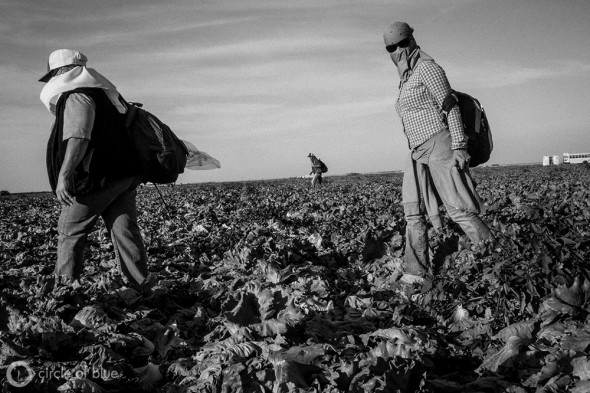 Lettuce pickers in Dan Errotabere’s field near Coalinga break for the day. With reduced water deliveries resulting from a statewide drought, Errotabere, like other Westlands farmers, has been forced to heavily tap groundwater to keep his crops growing.[/caption]
Lettuce pickers in Dan Errotabere’s field near Coalinga break for the day. With reduced water deliveries resulting from a statewide drought, Errotabere, like other Westlands farmers, has been forced to heavily tap groundwater to keep his crops growing.[/caption]
Lettuce pickers in Dan Errotabere’s field near Coalinga break for the day. With reduced water deliveries resulting from a statewide drought, Errotabere, like other Westlands farmers, has been forced to heavily tap groundwater to keep his crops growing. Photo © Matt Black / Circle of Blue.
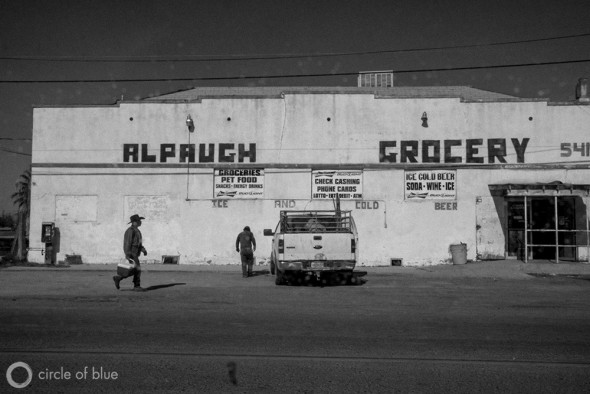 Pedestrians in Alpaugh, a small farmworker town in the Central Valley.[/caption]
Pedestrians in Alpaugh, a small farmworker town in the Central Valley.[/caption]
Pedestrians in Alpaugh, a small farmworker town in the Central Valley.
Photo © Matt Black / Circle of Blue.
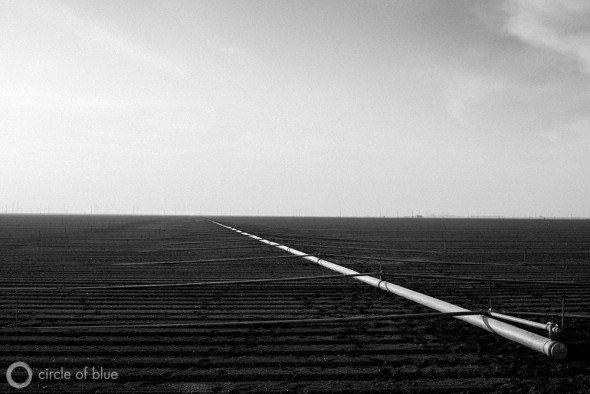 Irrigation pipes in the Westlands Water District, home to some of California’s largest farms. Growers in the area have seen their water supply cut in recent years, leading for calls to construct a new tunnel system to deliver more water from the California Delta.[/caption]
Irrigation pipes in the Westlands Water District, home to some of California’s largest farms. Growers in the area have seen their water supply cut in recent years, leading for calls to construct a new tunnel system to deliver more water from the California Delta.[/caption]
Irrigation pipes in the Westlands Water District, home to some of California’s largest farms. Growers in the area have seen their water supply cut in recent years, leading to calls to construct a new tunnel system to deliver more water from the California Delta. Photo © Matt Black / Circle of Blue.
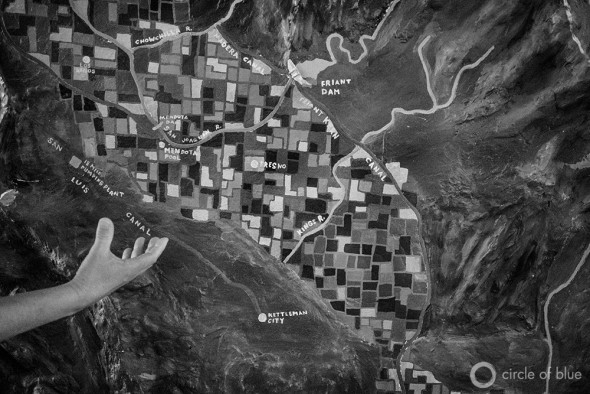 An overview map of the Central Valley project at the C.W. Jones Pumping Plant, a federal facility which supplies water to the project’s network of irrigation canals and reservoirs.[/caption]
An overview map of the Central Valley project at the C.W. Jones Pumping Plant, a federal facility which supplies water to the project’s network of irrigation canals and reservoirs.[/caption]
An overview map of the Central Valley project at the C.W. Jones Pumping Plant, a federal facility which supplies water to the project’s network of irrigation canals and reservoirs. Photo © Matt Black / Circle of Blue.
 A worker inspects a valve in the Pleasant Valley Pumping Plant, a facility that supplies irrgation water to the Central Valley’s vast Westlands Water District.[/caption]
A worker inspects a valve in the Pleasant Valley Pumping Plant, a facility that supplies irrgation water to the Central Valley’s vast Westlands Water District.[/caption]
A worker inspects a valve in the Pleasant Valley Pumping Plant, a facility that supplies irrigation water to the Central Valley’s vast Westlands Water District. Photo © Matt Black / Circle of Blue.
 Abe Sanchez, a mechanic at the C.W. Jones Pumping Plant, looks for the source of a small water leak in one of the facility’s massive electrical pumps.[/caption]
Abe Sanchez, a mechanic at the C.W. Jones Pumping Plant, looks for the source of a small water leak in one of the facility’s massive electrical pumps.[/caption]
Abe Sanchez, a mechanic at the C.W. Jones Pumping Plant, looks for the source of a small water leak in one of the facility’s massive electrical pumps.
Photo © Matt Black / Circle of Blue.
 Electric pump housings at the C.W. Jones Pumping Plant, a federal facility which withdraws water from the California Delta and sends it into the Central Valley Project’s network of irrigation canals and reservoirs.[/caption]
Electric pump housings at the C.W. Jones Pumping Plant, a federal facility which withdraws water from the California Delta and sends it into the Central Valley Project’s network of irrigation canals and reservoirs.[/caption]
Electric pump housings at the C.W. Jones Pumping Plant, a federal facility which withdraws water from the California Delta and sends it into the Central Valley Project’s network of irrigation canals and reservoirs. Photo © Matt Black / Circle of Blue.
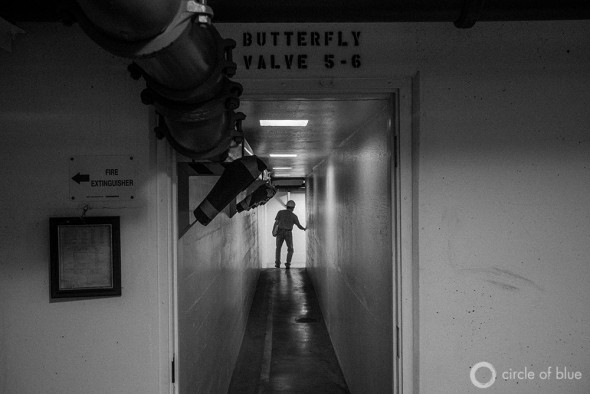 Ronald Silva, Chief Engineer at the C.W. Jones Pumping Plant, walks through the facility near Byron. The federally operated Jones plant – along with the nearby Harvey O. Banks Pumping Plant, operated by the California Department of Water Resources – mark the beginning of two of California’s great manmade rivers: the California Aqueduct and Delta-Mendota Canal.[/caption]
Ronald Silva, Chief Engineer at the C.W. Jones Pumping Plant, walks through the facility near Byron. The federally operated Jones plant – along with the nearby Harvey O. Banks Pumping Plant, operated by the California Department of Water Resources – mark the beginning of two of California’s great manmade rivers: the California Aqueduct and Delta-Mendota Canal.[/caption]
Ronald Silva, chief engineer at the C.W. Jones Pumping Plant, walks through the facility near Byron. The federally operated Jones plant – along with the nearby Harvey O. Banks Pumping Plant, operated by the California Department of Water Resources – mark the beginning of two of California’s great manmade rivers: the California Aqueduct and Delta-Mendota Canal. Photo © Matt Black / Circle of Blue.
 Salmon are being bred for reintroduction into the San Joaquin River.[/caption]
Salmon are being bred for reintroduction into the San Joaquin River.[/caption]
Salmon being bred for reintroduction into the San Joaquin River. Photo © Matt Black / Circle of Blue.

A livestock water tank parked in a dry field in California’s Central Valley.
A livestock water tank parked in a dry field in California’s Central Valley. Photo © Matt Black / Circle of Blue.

A dry irrigation ditch on the edge of the historic Tulare Lake Basin in California’s Central Valley.
A dry irrigation ditch on the edge of the historic Tulare Lake Basin in California’s Central Valley. Photo © Matt Black / Circle of Blue.

Maria Salcedo’s ten month old daughter, Ashley Alvarez, died from complications stemming from mutliple birth defects during a rash of such occurances in Kettleman City, a small farmworker town in the Central Valley.
Maria Salcedo’s ten-month-old daughter, Ashley Alvarez, died from complications stemming from multiple birth defects during a rash of such occurrences in Kettleman City, a small farmworker town in the Central Valley. Photo © Matt Black / Circle of Blue.

Kettleman City resident Maria Salcedo’s ten-month-old daughter, Ashley Alvarez, died from complications stemming from multiple birth defects during a rash of such occurrences between 2007 and 2008 in this small farmworker town in the Central Valley. Contaminated drinking water is viewed as one of the potential causes.
Kettleman City resident Maria Salcedo’s ten-month-old daughter, Ashley Alvarez, died from complications stemming from multiple birth defects during a rash of such occurrences between 2007 and 2008 in this small farmworker town in the Central Valley. Contaminated drinking water is viewed as one of the potential causes. Photo © Matt Black / Circle of Blue.
 The California Aqueduct flows south through the town of Kettleman City. The concrete river supplies water to farms, industry and tens of millions of residents in the Los Angeles Basin. Kettleman City’s residents, however, rely on contaminated groundwater wells in town for drinking and bathing.
The California Aqueduct flows south through the town of Kettleman City. The concrete river supplies water to farms, industry and tens of millions of residents in the Los Angeles Basin. Kettleman City’s residents, however, rely on contaminated groundwater wells in town for drinking and bathing.
The California Aqueduct flows south through the town of Kettleman City. The concrete river supplies water to farms, industry, and tens of millions of residents in the Los Angeles Basin. Kettleman City’s residents, however, rely on contaminated groundwater wells in town for drinking and bathing. Photo © Matt Black / Circle of Blue.
A man passes water vending machines in the small farmworker community of Stratford in California’s Central Valley. Photo © Matt Black / Circle of Blue.
 Evilia Robles, inspects her drinking water at her home in Alpaugh. The small farmworker community in California’s Central Valley suffers from high levels of arsenic and other contaminates in its water.[/caption]
Evilia Robles, inspects her drinking water at her home in Alpaugh. The small farmworker community in California’s Central Valley suffers from high levels of arsenic and other contaminates in its water.[/caption]
Evilia Robles inspects drinking water at her home in Alpaugh. The small farmworker community in California’s Central Valley suffers from high levels of arsenic and other contaminates in its water.
Photo © Matt Black / Circle of Blue.
 Juan Diego Hernandez, 9, bathes at his family’s home in Alpaugh. The small farmworker community in California’s Central Valley suffers from high levels of arsenic and other contaminates in its water.[/caption]
Juan Diego Hernandez, 9, bathes at his family’s home in Alpaugh. The small farmworker community in California’s Central Valley suffers from high levels of arsenic and other contaminates in its water.[/caption]
Juan Diego Hernandez, 9, bathes at his family’s home in Alpaugh. The small farmworker community in California’s Central Valley suffers from high levels of arsenic and other contaminates in its water. Photo © Matt Black / Circle of Blue.
 Areli Gutierrez after a bath at their home in Kettleman City. Many residents of this small farmworker community fear their water supply after a rash of defects struck the town.[/caption]
Areli Gutierrez after a bath at their home in Kettleman City. Many residents of this small farmworker community fear their water supply after a rash of defects struck the town.[/caption]
Areli Gutierrez after a bath at her home in Kettleman City. Many residents of this small farmworker community fear their water supply after a rash of defects struck the town. Photo © Matt Black / Circle of Blue.
 A dead almond orchard in California’s Central Valley.[/caption]
A dead almond orchard in California’s Central Valley.[/caption]
A dead almond orchard in California’s Central Valley. Photo © Matt Black / Circle of Blue.
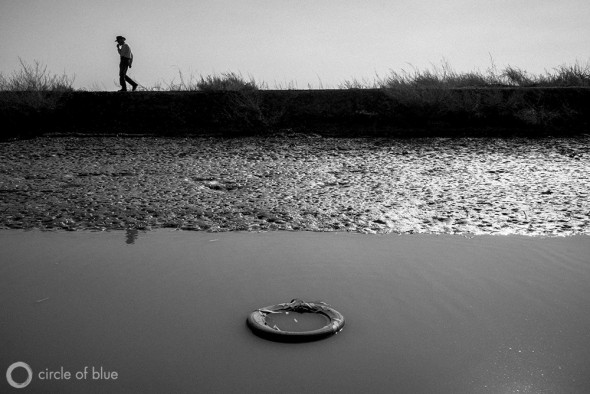
John Burchard, General Manager of the Alpaugh Community Services District, walks a ditch bank on the outskirts of town. The small farmworker community in California’s Central Valley suffers from high levels of arsenic and other contaminates in its drinking water.
John Burchard, general manager of the Alpaugh Community Services District, walks a ditch bank on the outskirts of town. The small farmworker community in California’s Central Valley suffers from high levels of arsenic and other contaminates in its drinking water. Photo © Matt Black / Circle of Blue.
 Carlos Sanchez installs irrigation sprinklers on a newly planted onion field in the Westlands Water District in California’s Central Valley.[/caption]
Carlos Sanchez installs irrigation sprinklers on a newly planted onion field in the Westlands Water District in California’s Central Valley.[/caption]
Carlos Sanchez installs irrigation sprinklers in a newly planted onion field in the Westlands Water District in California’s Central Valley.
Photo © Matt Black / Circle of Blue.
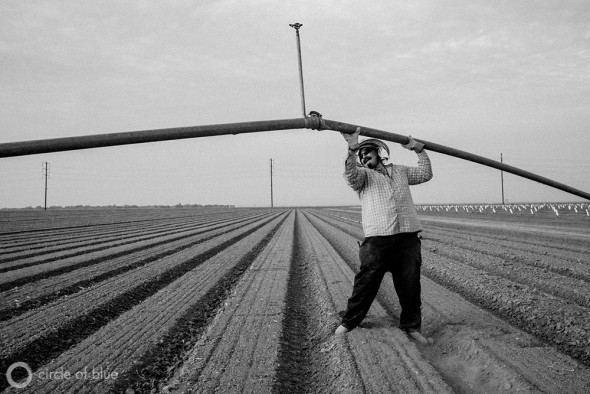 Carlos Sanchez installs irrigation sprinklers on a newly planted onion field in the Westlands Water District in California’s Central Valley.[/caption]
Carlos Sanchez installs irrigation sprinklers on a newly planted onion field in the Westlands Water District in California’s Central Valley.[/caption]
Carlos Sanchez installs irrigation sprinklers in a newly planted onion field in the Westlands Water District in California’s Central Valley. Photo © Matt Black / Circle of Blue.
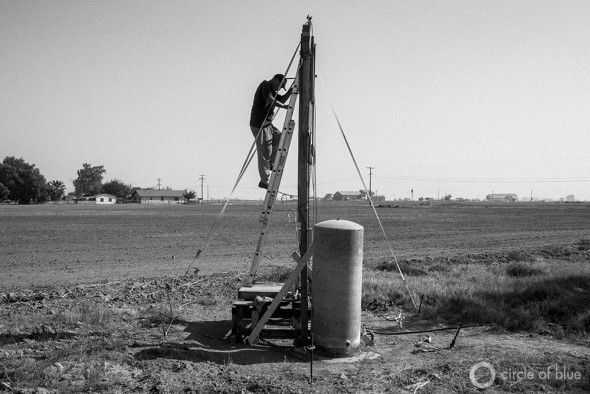 Dropping water tables and a shorted pump resulted in Louis Coronado’s water well going dry. He said he was unable to contract a professional driller because they are busy drilling new wells for area farmers, so built this scaffolding and repaired the well himself.[/caption]
Dropping water tables and a shorted pump resulted in Louis Coronado’s water well going dry. He said he was unable to contract a professional driller because they are busy drilling new wells for area farmers, so built this scaffolding and repaired the well himself.[/caption]
Dropping water tables and a shorted pump resulted in Louis Coronado’s water well going dry. He said he was unable to contract a professional driller because they are busy drilling new wells for area farmers. So he built this scaffolding and repaired the well himself. Photo © Matt Black / Circle of Blue.
A worker installs a grape trellis for a new vineyard being planted in the California Delta. Farmers in the region are concerned that the state’s plan to install tunnels in the area to siphon water south will threaten their agricultural water supply.
Photo © Matt Black / Circle of Blue.
Workers install a grape trellis for a new vineyard being planted in the California Delta. Farmers in the region are concerned that the state’s plan to install tunnels in the area to siphon water south will threaten their agricultural water supply. Photo ©Matt Black / Circle of Blue.
Gates block access to the California Aqueduct as it flows through the Central Valley. Photo © Matt Black / Circle of Blue.
Workers install a grape trellis for a new vineyard being planted in the California Delta. Farmers in the region are concerned that the state’s plan to install tunnels in the area to siphon water south will threaten their agricultural water supply. Photo ©Matt Black / Circle of Blue.
Old concrete irrigation pipe in California’s Central Valley. Photo © Matt Black / Circle of Blue.
A male Chinook salmon is measured and tagged after being caught in a “Fyke Net” in the San Joaquin River. The fish will be transported upstream by truck, bypassing obstacles, on its way to the historic salmon spawning grounds near Fresno in the Sierra Nevada mountains. Photo © Matt Black / Circle of Blue.
Bureau of Reclamation Fisheries Biologist Zak Sutphin checks a fish trap set in the San Joaquin River near the town of Newman in California’s Central Valley. The trap, also known as a “Fyke Net,” is used to catch salmon so they can be transported upstream by truck, bypassing obstacles, on their way to their historic spawning grounds near Fresno in the Sierra Nevada mountains.
Photo © Matt Black / Circle of Blue.
Lettuce pickers take a break after working a field in the Central Valley’s vast Westlands Water District.
Photo © Matt Black / Circle of Blue.
Becky Quintaña, a community water activist, walks along a canal near her home in Seville, a small town in California’s Central Valley. One of her community’s main domestic water supply lines runs along the bottom of this canal and frequently breaks. One of Quintaña’s family members was brushing his teeth in the morning when a tadpole came though the faucet and into the bathroom sink. Photo © Matt Black / Circle of Blue.
© 2023 Circle of Blue – all rights reserved
Terms of Service | Privacy Policy
This site uses cookies. By continuing to browse the site, you are agreeing to our use of cookies.
OKLearn moreWe may request cookies to be set on your device. We use cookies to let us know when you visit our websites, how you interact with us, to enrich your user experience, and to customize your relationship with our website.
Click on the different category headings to find out more. You can also change some of your preferences. Note that blocking some types of cookies may impact your experience on our websites and the services we are able to offer.
These cookies are strictly necessary to provide you with services available through our website and to use some of its features.
Because these cookies are strictly necessary to deliver the website, refusing them will have impact how our site functions. You always can block or delete cookies by changing your browser settings and force blocking all cookies on this website. But this will always prompt you to accept/refuse cookies when revisiting our site.
We fully respect if you want to refuse cookies but to avoid asking you again and again kindly allow us to store a cookie for that. You are free to opt out any time or opt in for other cookies to get a better experience. If you refuse cookies we will remove all set cookies in our domain.
We provide you with a list of stored cookies on your computer in our domain so you can check what we stored. Due to security reasons we are not able to show or modify cookies from other domains. You can check these in your browser security settings.
We also use different external services like Google Webfonts, Google Maps, and external Video providers. Since these providers may collect personal data like your IP address we allow you to block them here. Please be aware that this might heavily reduce the functionality and appearance of our site. Changes will take effect once you reload the page.
Google Webfont Settings:
Google Map Settings:
Google reCaptcha Settings:
Vimeo and Youtube video embeds:
